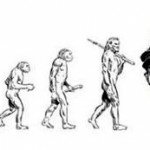Physical Address
304 North Cardinal St.
Dorchester Center, MA 02124
Physical Address
304 North Cardinal St.
Dorchester Center, MA 02124

If the messages that are embedded in folklore mean anything, then until very recently humans were terrified of the natural environment (Grimm, et. al., 1915). In many cases, the scariest part of folk tales involves foolish individuals–often kids, in order to emphasize the cautionary nature of the tales–who fall prey to one of the many […]
Timothy McGettigan | Jan 24, 2013 | Comments 1 
Scholars have referred to Homo sapiens’ game-changing capacity to transform the biological evolutionary process into an intellectual exercise–or what I refer to as super-adaptability–in a variety of ways. Karl Popper distinguishes between biological and cognitive problem solving. In so doing, Popper emphasizes that for most organisms the one and only means of resolving survival problems […]
Timothy McGettigan | Dec 30, 2012 | Comments 0 
Fate is the most potent weapon in a the arsenal of determinists like Stephen Hawking. To contend, as determinists plainly do, that the outcomes of events are pre-determined is essentially the same as saying that the ebbs and flows of history are all dictated by fate. Actors, whether animate or inanimate, have no control over […]
Timothy McGettigan | Nov 16, 2012 | Comments 0 
As a sociologist I often get heartburn listening to others talk about evolution. As every sociology student knows, from the time Herbert Spencer first coined his “survival of the fittest,” Darwin’s thoughts have been used, misused, and exploited in service of the status quo. You beat somebody down? You dominate another in business? You accumulate obscene wealth? You create a thousand losers for every winner? That’s the natural order of things. Like Darwin NEVER said, survival of the fittest. But times they are a changin. From over due behavioral corrections, fresh air research onthe stupidity of competition (ya I said it), to this provocative article that suggests that having “big winners” is bad for our general survivability, we scientists are starting to reclaim our truths from the social classes that have exploited it. Yay team!
Avi Schroeder | Jan 30, 2011 | Comments 0 
Through the medium of kinship, early humans developed cooperative arrangements that, according to Marshal Sahlins, were apparently mandated by virtue of the conditions of life. In his words, “The emerging human primate, in a life-and-death-struggle economic struggle with nature, could not afford the luxury of a social struggle. Co-operation, not competition, was essential…. Hobbe’s famous […]
Dr. Michael Sosteric | Mar 17, 2010 | Comments 5